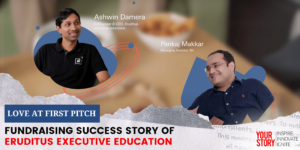Hello Reader,
Day 1 of the 5G spectrum auction saw four rounds of bidding involving telecom giants Jio, Airtel, Vi, and Adani. About 72,000 MHz under nine bands are up for sale with a validity period of 20 years. According to Telecom Minister Ashwini Vaishnaw, the bid amount exceeded Rs 1.45 lakh crore.
Round five of the bidding process will continue today.
In related news, India manufactured mobile phones worth Rs 5,277 crore in FY22, making it the second-largest maker of these devices globally, show government data.
Also, the central government is not contemplating any relaxation to the mandatory provisions of e-invoicing under the goods and services tax (GST) regime, finance minister Nirmala Sitharaman has said.
In international news, the crisis in Ukraine has ended years-long multinational collaboration on space exploration between Moscow and the West, with Russia saying it has decided to quit the International Space Station “after 2024”.
Meanwhile, mechanical engineers from Rice University have turned spider cadavers into robots called “necrobots”. The robots are able to function as mechanical grippers.
As if spiders, dead or alive, aren’t already the stuff of nightmares.
The stick figure personality test
Can a person’s response to an image provide insights into their personality? HR tech startup Pmaps says that it does.
Delhi-based Pmaps offers data-driven visual psychometric tests for hiring people, especially for blue-collar jobs. The aim is to help companies reduce the time and cost of hiring and ultimately attrition.
Connecting the dots:
- The startup has more than 50 clients, including Max Life Insurance, Vi, Dish TV, and RBL Bank. It says it has a revenue pipeline of $100,000.
- Last month, Pmaps raised Rs 5 crore in a Series A funding round led by Indian Angel Network and Lets Venture.
- Pmaps conducts 20,000 tests a month. In the coming months, it plans to increase this number by five times and expand its presence beyond India to the Middle East, the UK, the US, and South Asia.
“Humans learned visual as a sign before text or calligraphy. We all relate to pictures,” says Saurabh Rana, Founder, Pmaps. “Visuals are universal and are more likely to get an honest answer than a text-based question asking if a person is empathetic or not.”
Music on the blockchain
While music streaming platforms like Spotify and Amazon Music offer a space for indie artistes to get discovered, they offer little as royalty to musicians.
Enter The Swaraj Projekt—a Web3 native startup that enables musicians to create music NFTs (Non-Fungible Tokens) that are then auctioned off to listeners. Every transaction involving NFTs is stored on the Ethereum blockchain, enabling artistes to earn royalties on all subsequent sales in the secondary market.
“We want to create a fair environment where 100 genuine fans of an artiste would be willing to pay to produce their music, and are attempting to bring back the sense of ownership,” says co-founder Rohit Ganapathy.
Creating music:
- The Swaraj Projekt is launching NFTs for Volume (1) of its Genesis collection of 32 songs.
- Each NFT will have a base price of 0.1-0.2 ETH.
- The startup claims that 75 percent of revenue from the auction will be given to artistes.
A new approach to learning
Sriram Subramanian and Madhu Agarwal began their edtech venture with one goal in mind—to solve the gap between academics and the workplace.
While classroom learning is divided into subjects such as English, Math, Physics, and History, the actual workplace operates on the principles of understanding technology, people, and money.
“We wanted to bridge this gap so that students don’t graduate into the real world without a compass for where they’re going. We began with a pilot of three programs of 10 hours each, where students could learn about three fields—entrepreneurship, marketing, and technology. We launched the pilot programs in April 2020, and in the first three months, we had enrolled 1,200 students,” says Sriram.
Real-world learning:
- From 1,200 students in June 2020, the startup has now expanded to graduate over 7,000 students.
- Sriram adds that student feedback has been overwhelmingly positive. The team had a completion rate of over 98 percent and an NPS higher than 75 percent.
- The team is building a tech layer to deliver bite-sized versions of the programmes and make user acquisition faster and more cost-effective.
Now get the Daily Capsule in your inbox. Subscribe to our newsletter today!



![Read more about the article [Funding roundup] O’2 Nails India, FlexC, Speedlabs raise early-stage deals](https://blog.digitalsevaa.com/wp-content/uploads/2022/05/Funding-1587044486257-300x150.png)
![Read more about the article [Funding alert] Cold-chain startup Celcius raises seed round from Eaglewings Ventures, others](https://blog.digitalsevaa.com/wp-content/uploads/2021/05/Imageg2mr-1620736979578-300x150.jpg)





